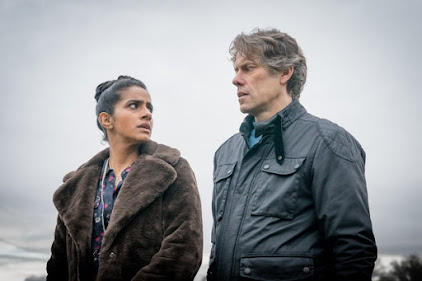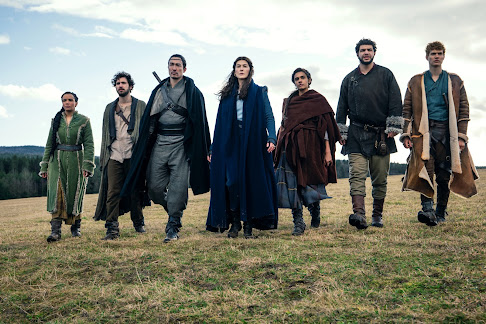The Tenth Doctor is reunited with an old friend for a new series of adventures across time and space...but a series of battles take their toll and leave him alone, wandering aimlessly and increasingly over-confident in his own power.
In 2007, Doctor Who showrunner Russell T. Davies and lead actor David Tennant jointly decided that they would leave the series they had helped become the biggest thing on British television. Rather than leave immediately after the upcoming season (Davies' fourth and Tennant's third), they decided to extend their stay through four feature-length episodes to air through 2009 and into early 2010. The result was the longest season of Doctor Who to air since 1969 in terms of minutes, and the longest-ever in terms of how much time it spanned (Christmas Day 2007 to New Year's Day 2010).
The greatly elongated season opened with the show's third Christmas episode, Voyage of the Damned. A pastiche of disaster movies like The Towering Inferno and The Poseidon Adventure, the episode also riffs on Titanic (the spacecraft is literally a replica of the Titanic). The Doctor is effectively joined by a one-off companion, Astrid Peth, played by pop superstar Kylie Minogue, but also features a notable starring turn by then up-and-comer Russell Tovey as Midshipman Frame (Tovey would later work with Davies on his dystopian SF show, Years and Years). As with most of the Christmas specials, it's a fun romp which doesn't try to be anything else, and succeeds thanks to great guest performances and Tennant being on fine form. The main surprise is how low-key Minogue is in her guest role, and I'm not sure the show makes a strong argument for her being a long-term companion.
The fourth series itself kicks off with the Doctor being reunited with Donna Noble (Catherine Tate) from the second Christmas special, The Runaway Bride. The episode itself is a bit of disposable Doctor Who frippery - aliens use human fat to create a race of little creatures called the Adipose who do...well, not a lot really - but as a framing device to reunite the Doctor and Donna, it works well enough.
The Fires of Pompeii emerges as possibly the weakest episode of the season, which is a shame because its premise (the Doctor at Pompeii!) is very good. The show gamely tries to show Roman culture with life and colour, a bit like the HBO/BBC coproduction Rome, even using the same sets, but goes overboard with a lot of overacting from the guest performers. It is a fun episode for playing "spot the future Doctor Who star," as future companion Karen Gillan and future Doctor Peter Capaldi both play guest roles.
We then have a long run of "pretty solid but not spectacular" episodes: Planet of the Ood is a solid "base under siege" story with a nice twist and two-parter The Sontaran Stratagem/The Poison Sky is a fun 1970s throwback to the UNIT stories of that era, as well as reintroducing Martha Jones (Freema Agyeman) to the mix. The Doctor's Daughter is a clever story but one that feels more Star Trek than Doctor Who. It works mainly due to a game performance from Georgia Moffett as Jenny (now David Tennant's wife), the titular Doctor's daughter, even if the failure of the show to follow up on the episode's cliffhanger ending remains a bit odd.
The Unicorn and the Wasp is an out-and-out comedy episode revolving around the Doctor joining forces with a young Agatha Christie to take down a giant alien wasp which can shapechange into human form. It's a barmy premise but some solid writing and Tennant's gleeful fanboying of Agatha Christie make it work.
The season makes a massive step-up in quality towards its end. Steven Moffat's two-parter Silence in the Library and Forest of the Dead is outstanding, featuring a planet-sized library where the Doctor meets River Song, a future friend and ally who has already met him dozens of times but he has no idea who she is. Whilst Moffat would take this great idea and overuse it to the point of tedium in later seasons, here it remains a fresh and exciting idea. The two-parter only loses a little because the alien threat is a little too nebulous at times and the rules about how it moves around and kills people are quite vague.
Davies delivers what might be his single finest script for Doctor Who in Midnight. A taut, claustrophobic horror-thriller, it reminds me of Red Dwarf's Marooned and Breaking Bad's The Fly in being a taut character piece necessitated by budget overruns on other episodes. Staging all the action on a single set with a top-tier cast and some of Davies's best dialogue on the entire series, with a hugely ambiguous ending, it's the new incarnation of Doctor Who at its very best.
Turn Left, a "what if?" story which asks the question about what would have happened if Donna had never met the Doctor, is almost as good. It shows an alternate timeline of Season 4 with the Doctor's other allies having to step into the breach to save the day, but gradually being killed off because they're not quite as capable. Another last-minute script replacement, Davies had to steal from his own backlog of great ideas, this one about the collapse of a future Britain into a dystopian nightmare. Fortunately, he was able to rescue the premise for his 2019 mini-series, Years and Years. The episode here is extremely effective.
The two-part sort-of season finale, The Stolen Earth and Journey's End, is Doctor Who doing The Avengers four years before The Avengers. The Daleks steal the Earth and launch an invasion of the planet, forcing not just the Doctor and Donna but all of the friends and allies he has built up over the last three years to take a stand. Thus we get: Captain Jack, Gwen and Ianto from Torchwood, Sarah Jane Smith and Luke from The Sarah Jane Adventures, Martha, Mickey, Rose and even Rose's mum (and that's not even counting cameos from UNIT characters, Harriet Jones, K9 and the Judoon). On the Dalek side we also get the return of Dalek Caan, a new Supreme Dalek and even the return of the Daleks' creator, Davros. It's all ridiculously daft and comes across as the most ludicrous piece of Doctor Who fanfiction, but it's also put together with verve and enthusiasm. This is Doctor Who in its most hyper-budgeted panto mode, but it's so much fun you don't entirely care. The main fly in the ointment here is the somewhat weird way Donna is removed from the show and the even weirder way the Doctor is able to have his cake and eat it with regards to Rose.
The show changes gears heading into the next round of specials. The Next Doctor, the 2008 Christmas Special, is a splendid episode featuring an absolutely barn-storming performance by David Morrissey as a man who is imprinted with the memories of the Doctor, becoming a mid-19th Century swashbuckling gentleman scholar and adventurer version of the Time Lord. It's a brilliant performance enhanced when his character discovers his real past history. At the time the episode was annoying because it seemed to rule out Morrissey from becoming the Doctor for real, though subsequent casting has suggested that's not an impediment to that happening in the future. The somewhat brain-melting finale in which a 2,000-foot-tall Cyberman stomps on London (featuring some of the best vfx since the show's return) is really just the icing on the cake.
Things continue in "romp mode" for Planet of the Dead, the first-ever episode of Doctor Who to be produced in HD. Like Human Nature, this episode uses one of the Doctor Who New Adventures novels as its inspiration, in this case The Highest Science. Unfortunately, that book's splendid aliens, the Chelonians, are not used here (the production team planned to, before realising the actors would die in full body prosthetics in the location filming in the desert). The episode is a solid, silly adventure with a winning guest performance by Michelle Ryan as cat burglar Christina de Souza.
Things ramp up with The Waters of Mars, a crucial and perhaps underrated Doctor Who story in which the Doctor's inability to change "fixed points in time" pushes him to breaking point and causes a dangerous eruption of his ego. The guest cast is excellent, especially Rome's Lindsay Duncan as Captain Adelaide Brooke, and the episode handles its transition from standard Doctor Who romp into a really dark piece of characterisation (culminating in a suicide) extremely well.
The prolonged season finishes off with The End of Time, an epic two-part story in which the Doctor has to contend with a resurrected Master but the situation escalates to bring in the return of the Time Lords and the threatened destruction of time itself. The story suffers a little from the "threat creep" that the show has repeatedly endured over the years (and continues to suffer from today), but excellent performances from Tennant, John Simm, Timothy Dalton and Bernard Cribbins give the story a real heft. The prolonged epilogue, in which the Tenth Doctor says goodbye to all his companions, risks over-indulgence but the story just about manages to justify it, since Davies seems aware that Tennant will likely go down as one of the very best actors to play the Doctor and isn't going to skimp on milking that for all its worth.
The fourth series of the rebooted Doctor Who (****½) is mostly entertaining, with several outstanding episodes and at least one all-time classic. Tennant is on fire throughout, and I think made the wise choice to leave just as he'd done all he could with the character. However, it does feel a shame that Davies bailed out just as he really hit his stride as a Doctor Who writer. Fortunately, we'll soon have a second run of episodes by him and to see what extra skills his time away from the show has given him. The season is currently available in the UK via BBC iPlayer and in the USA via HBO Max.
- 4X: Voyage of the Damned ****
- 401: Partners in Crime ***½
- 402: The Fires of Pompeii **½
- 403: Planet of the Ood ***½
- 404: The Sontaran Stratagem ***½
- 405: The Poison Sky ***½
- 406: The Doctor's Daughter ***½
- 407: The Unicorn and the Wasp ***½
- 408: Silence in the Library ****½
- 409: Forest of the Dead ****½
- 410: Midnight *****
- 411: Turn Left ****½
- 412: The Stolen Earth ****½
- 413: Journey's End ****
- 414: The Next Doctor ****½
- 415: Planet of the Dead ****
- 416: The Waters of Mars ****½
- 417: The End of Time - Part 1 ****½
- 418: The End of Time - Part 2 ****½


















